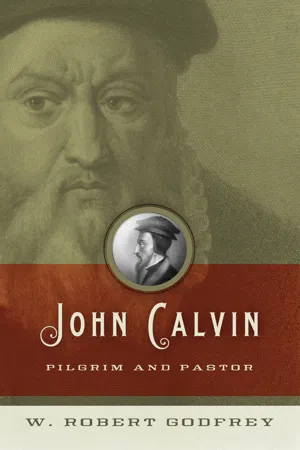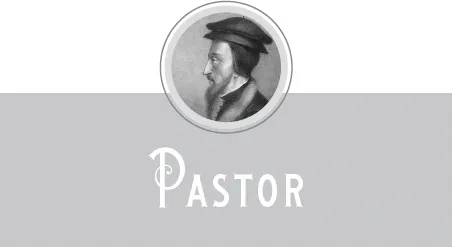![]()
PASTER
![]()
5
THE CALL BACK TO GENEVA
While Calvin was prospering in Strassburg, the church situation in Geneva had deteriorated. The city had become polarized into two camps. One, known as the Guillermins (followers of Guillaume Farel), were strong supporters of the vision of the church defended by Farel and Calvin. They criticized both the city council for exiling Farel and Calvin and the compliant ministers who had submitted to the demands of the city government. The other camp, who opposed Farel and Calvin, was derisively call the Artichokes.
As time passed and increasing numbers of citizens realized that stronger leadership was needed in the church, the supporters of Farel and Calvin gained more and more political power. In September 1540 the city council voted to invite Calvin back to take up his ministry in Geneva again. The invitation was easy for Calvin to refuse. He was not interested at all in going back.
The city council then turned to Farel, asking him to use his influence to convince Calvin to return. Farel, of course, had great concern for the church in Geneva that he had introduced to the Reformation. Farel’s passion to convince Calvin to return is remarkable in that the city council was not inviting Farel to return. But again Farel recognized that Calvin was the man Geneva needed.
Farel wrote a letter that Calvin called “thundering,” insisting that Calvin was a minister of the church in Geneva and must return to take up his responsibilities there. Farel even traveled from his church in Neuchatel, Switzerland to Strassburg to plead with Calvin face-to-face. With great reluctance Calvin accepted Farel’s advice again. But he did not go eagerly or confidently. He was not sure that he would physically survive a second call to Geneva, and he believed that he would probably be ejected again if he did survive. But he would not be guilty of deserting his post and so decided to return.
The calls to Geneva and Strassburg offer interesting insights into Calvin’s character. In his writings he seemed so certain and confident in his teaching and theology. But in facing the calls to service in his life he seemed uncertain and wavering. In his writings he believed he was presenting biblical truth about which he had absolute certainty. In his personal decisions he had no infallible source of knowledge. He did, however, put great trust in the wise counsel of friends. He was willing to set aside his own desires and instincts about these calls to follow sound advice. He did not seek to determine the will of God in these matters by some internal, mystical experience by himself. He rather looked for the Lord to speak to him through other faithful servants of the Word.
Calvin did not hurry to return. It took him a year to arrange his affairs, but in August 1541 he arrived in Geneva. On his first Sunday there, he mounted the pulpit in the leading church of Geneva, St. Pierre. What would Calvin say in his sermon? He simply took up his exposition of the Scripture at the place where it had been interrupted at the time of his exile. He was not a politician or a propagandist. He was a preacher of the Word.
In 1541 Calvin was a more mature and patient man than he had been in 1538. Although he was still only thirty-two, he had learned the value of waiting and determined to try to work with those who had opposed him. He had made clear to the city council before he returned that he thought the church order of the city needed to be revised. He had sent his revised church order, known as the “Draft Ecclesiastical Ordinances,” to the city council and requested consideration of it. He did not make acceptance of his revisions a condition of his return.
Calvin’s revisions addressed as one of his principal concerns the matter of church discipline that had been at the center of his troubles with the Genevan city council. He still believed that discipline was vital to the well-being of the church. Calvin proposed as something of a compromise that the matter of discipline would rest in the hands of the ministers and elders of the church with the understanding that in the extreme case of excommunication the city council would be consulted. Calvin and the city council reached a compromise by leaving a little ambiguity in the church order on the exact role of the city council in excommunication. Calvin was not inconsistent by agreeing to ambiguity here. He believed that compromise and ambiguity could be legitimate on issues of secondary importance in the life of the church but not in the foundational theology of the church. The result was that the church in Geneva came to possess a much greater measure of independence from state control than any other Protestant church in Europe.
Under the revised church order and Calvin’s strong leadership, the church in Geneva took on the institutional forms that would ensure its strength and endurance. Ministers preached every Sunday morning and afternoon as well as preaching early every workday morning. Ministers catechized the children every Sunday at noon. On Fridays the ministers and others who wished to attend met weekly in a gathering called the Congregation to hear a sermon from a minister and discuss the preaching. They also met as the Venerable Company of Pastors to discuss and decide matters of doctrine.
Elders, with ministerial participation, met weekly as the Consistory to consider disciplinary matters in order to regulate and improve the moral life in Geneva. They dealt with a wide range of issues, from public drunkenness to adultery. The elders also visited families before every quarterly Communion.
The church also had active deacons to assist with the needs of the poor. The deacons would become very involved in helping thousands of religious refugees from France get settled in Geneva.
One of the ways in which Calvin wished to see the religious life of the church improved was through the catechizing of the young. For that purpose Calvin wrote a catechism that was published in its final form in 1545. This catechetical instruction was one of the ways in which reformation took institutional form in order to be passed from one generation to another.
Calvin’s Genevan Catechism is not one of the great Reformed catechisms. It is too long both in the number of questions—374—and in the length of many of its answers. It is also somewhat flawed in its pedagogy. Occasionally the question has the content, and the catechumen must only agree. For example, at one point the minister as catechist states, “We are not then to understand that these words simply condemn every picture and sculpture whatever. Rather we are forbidden to make images for the purpose of seeking or worshipping God in them, or, what is the same thing, worshipping them in honour of God, or of abusing them at all for superstition and idolatry.” The catechumen must simply reply, “Quite right.”1Catechumens may have liked this approach to pedagogy, but it did not succeed in making them express the truth in their answers.
Still Calvin’s catechism has its strengths. Its theology is clear, and some of its answers are excellent. Several examples can illustrate this. The first involves God’s sovereignty even over the wicked:
Question: “Now what shall we say of wicked men and devils? Shall we say that they too are subject to him [God]?”
Answer: “Although he does not govern them by his Spirit, yet he checks them by his power, as with a bridle, so that they are unable even to move unless he permits them to do so. Further, he even makes them ministers of his will, so that they are forced, unwilling and against their inclination, to effect what seems good to him.”
Question: “What benefit accrues to you from the knowledge of this?”
Answer: “Very much. For it would go ill with us, if anything were permitted wicked men and devils without the will of God; then our minds would never be tranquil, for thinking ourselves exposed to their pleasure. Only then do we safely rest when we know them to be curbed by the will of God and, as it were, held in confinement, so that they cannot do anything but by his permission, especially since God himself undertakes to be our guardian and the captain of our salvation.”2
The second example is from a section on the work of the Spirit:
Question: “This needs a rather clearer explanation.”
Answer: “I mean that the Spirit of God, while he dwells in our hearts, operates so that we feel the virtue of Christ (Rom. 5:5). For when we conceive the benefits of Christ with the mind, this happens by the illumination of the Holy Spirit; it is by his persuasion that they are sealed in our hearts. In short, he alone gives them a place in us (Eph. 1:13). He regenerates us, and makes of us new creatures (Tit. 3:5). Hence whatever gifts are offered us in Christ, we receive them by virtue of the Spirit.”3
Through these institutional means and ministries the church began to take on the life that Calvin believed would provide for its health and growth in faith. Part of the genius of Calvin, as Farel had early recognized, was his ability to organize the church into forms that would propagate and preserve true religion.
Calvin himself plunged into intense activity as a minister in Geneva. Throughout his whole life he was very hard-working and productive. He preached eight or nine times every two weeks—twice on Sunday and each weekday morning every other week. His preaching was expository through books of the Bible. He usually preached on three to four verses of the New Testament and ten to twelve verses of the Old Testament. On Sundays he always preached from the New Testament, the only exception being a series of sermons on the Psalms on Sunday afternoons. He preached from the Old Testament on weekdays. His sermons were usually about thirty minutes long. He also often preached for the ministers at the weekly Congregation on Friday evenings. Apparently he preached without notes directly from the Greek and Hebrew texts of the Bible.
For much of his time in Geneva he would lecture regularly at the Academy of Geneva as part of the education of future ministers. He also took active part in the pastoral work of the church, especially visiting the sick. When the bubonic plague, the Black Death, broke out in Geneva in 1542, Calvin wanted to visit the sick along with his ministerial colleagues. Even though people did not know about germs and hygiene, they did know that those close to the sick were more likely to become sick. To protect Calvin’s health for the sake of his other work, the city council ordered him not to visit those with the plague.
In the midst of all this other work Calvin also found time for study and writing. Beginning in 1546 he produced on average more than one commentary per year on a book of the Bible. He also wrote various theological treatises and carried on a voluminous correspondence with leaders and friends all over Europe. Many of his sermons were taken down by secretaries as he preached and were then published. About fifteen hundred were published, but many others have been lost.
With all of the responsibilities it would have been no surprise if the commentaries and sermon...

